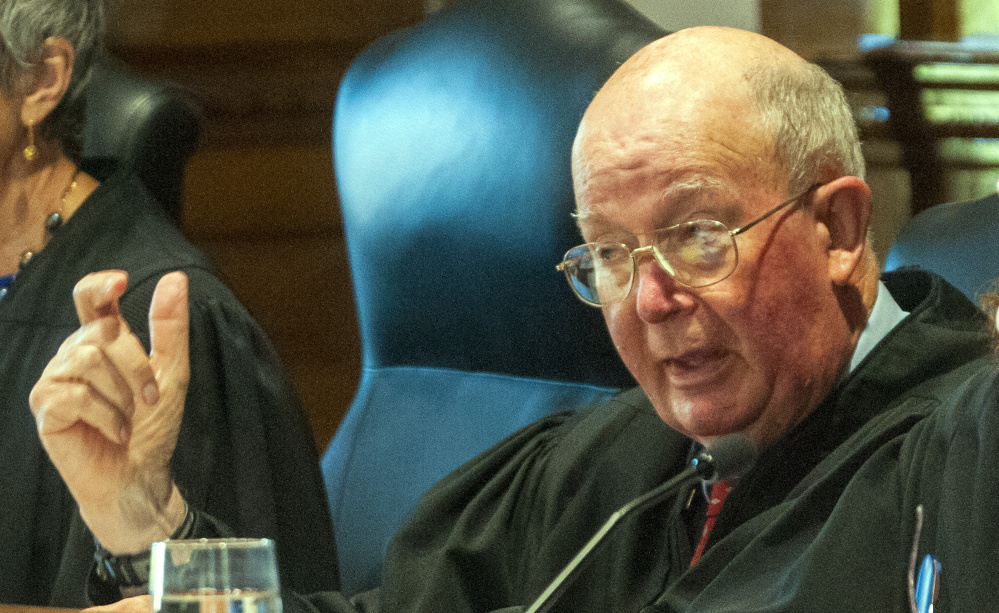AUGUSTA — The Maine Supreme Judicial Court on Tuesday heard appeal arguments in a case where a Sidney man is serving 50 years in prison for raping a 4-year-old and recording it.
Attorneys for Eric L. Bard, 26, appealed several of the judge’s rulings in the case as well as the length of the overall sentence.
Bard is serving his sentence at the Maine Correctional Center in Windham and was not at the oral argument session.
However, two of his family members watched it from the back of the courtroom.
His appeal was the first of 18 that the state supreme court is to hear during a three-day session in Augusta. The justices sit in a ceremonial courtroom on the second floor of the Kennebec County Courthouse. The courtroom is accessed through the Capital Judicial Center next door.
The court issues opinions in writing at a later date.
Bard, through attorneys Gina Yamartino and Ronald Bourget, is appealing three rulings in the case — those about the admittance of evidence found on a cellphone memory card, about Bard’s competence to stand trial and about the length of the sentence.
Bard pleaded guilty to various charges involving sexual exploitation of a minor and gross sexual assault on the condition that those rulings would be reviewed.
On Tuesday Yamartino told the justices, “All of us, including Eric Bard, have a Fourth Amendment right against illegal searches and seizures.”
She focused on the seizure of a micro SD card, a cellphone data storage device about the size of a small fingernail, and asked the six justices to overturn Justice Donald Marden’s August 2014 refusal to grant a defendant’s motion “to suppress all statements and evidence in the possession of the State resulting from activities of the police at (Bard’s) residence on June 19, 2012 and thereafter.”
Bard refused permission for police to take the cellphone storage device.
“This is tantamount to his cellphone,” Yamartino said. During the same search of his home, Bard allowed police to take a flash drive as well as computers.
“Eric’s consent when they were there was searching for computers only,” Yamartino said. Instead of taking the cellphone storage device away, she said police could have left someone there with it and had another officer go collect a warrant to seize it.
She said that when they got a warrant to search it 10 days later, “It was not lawfully in their custody,” and therefore the photos and videos found on it should not have been used by the prosecution.
Associate Justice Ellen Gorman asked Yamartino if officers could have just seized the item under the “plain view doctrine” when they found it in the search that was consented to by Bard.
Yamartino said they could not.
Gorman noted that police are allowed to seize items that could be quickly hidden or changed.
“This is something that could be very easily disposed of,” she said.
Gorman also said that Bard “admitted that he was the person who was essentially trolling for new victims through Craig’s List.” The investigation began when a woman reported seeing a “creepy” ad on Craig’s List from someone offering to baby-sit, photograph and bathe children. The woman reported it to the Maine State Police, who learned that Bard had placed the ad.
Assistant Attorney General Paul Rucha asked the justices to uphold Marden’s rulings. He also told the justices that the micro SD card contained all the images used to prosecute Bard.
Bard had told police they would likely find child pornography on all the computers in the house, and on one that he had sold several days prior to the search might also have had child pornography on it.
Rucha cited other court cases where similar seizures were held to be valid. He also said he viewed the Bard case as offering “an opportunity for the court to clarify that officers can seize evidence that could be easily destroyed.” He also said that the 10-day lapse between seizing the item and then obtaining a search warrant for it is explained in part by some references indicating the officer involved had done another search elsewhere earlier that same day and was working only one more day before taking vacation.
Yamartino said she would rely on the written arguments in the briefs filed in the case to support the defense contention that Bard was not competent to enter a plea and to work with his attorneys.
There were several evaluations of Bard’s mental state. During the various court hearings in the case, Bard rocked to and fro almost continuously in the courtroom, his long hair covering his face. However, videos of Bard in the Kennebec County jail showed him interacting with other inmates in a large common area and talking with corrections officers. There were no images of the rocking motion in the video clips played in court.
The judges asked Rucha who has the burden to prove competence of a defendant.
He replied that once the issue is raised, the burden should be on the defense.
“They are the ones who have best access to the facts and access to the defendant,” Rucha said.
Bard pleaded guilty on the second day of his jury trial in August 2014 to 11 charges of sexual exploitation of a minor, seven charges of gross sexual assault on a child under 12, two charges of unlawful sexual contact and one charge of assault.
The offenses occurred between Dec. 1, 2011, and April 30, 2012, while Bard was baby-sitting the girl in Augusta. Investigators say he had befriended the child’s mother in 2010.
On Tuesday as well as in his written brief, Rucha said that the sentence could be sent back to Marden for the judge to include the reasons he imposed consecutive sentences of 30 years on the gross sexual assault charges and 20 years on the charges of sexual exploitation of a minor under 12.
Betty Adams — 621-5631
badams@centralmaine.com
Twitter: @betadams
Send questions/comments to the editors.








